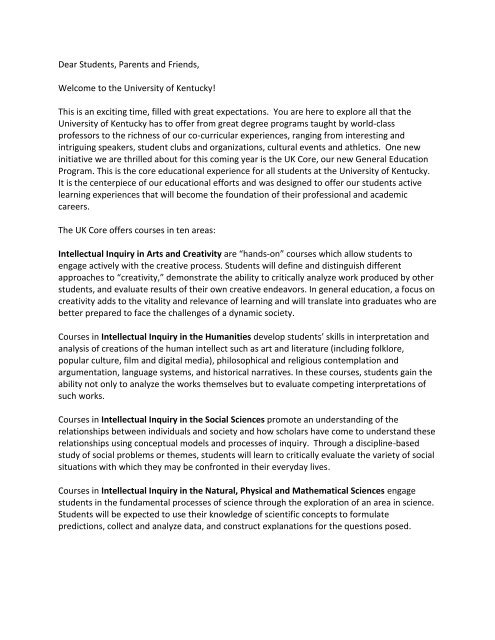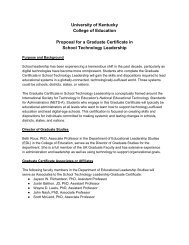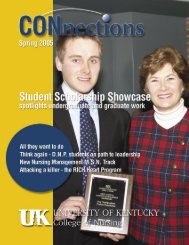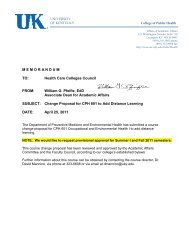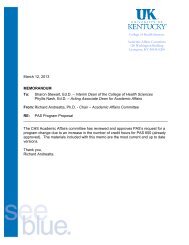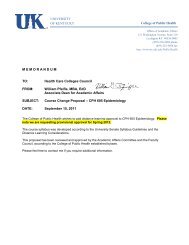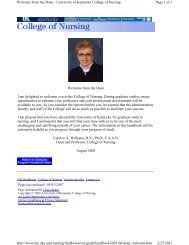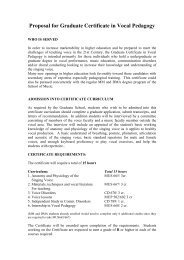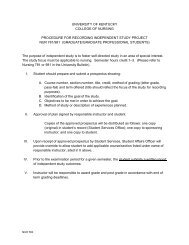UK Core - University of Kentucky
UK Core - University of Kentucky
UK Core - University of Kentucky
Create successful ePaper yourself
Turn your PDF publications into a flip-book with our unique Google optimized e-Paper software.
Dear Students, Parents and Friends,Welcome to the <strong>University</strong> <strong>of</strong> <strong>Kentucky</strong>!This is an exciting time, filled with great expectations. You are here to explore all that the<strong>University</strong> <strong>of</strong> <strong>Kentucky</strong> has to <strong>of</strong>fer from great degree programs taught by world-classpr<strong>of</strong>essors to the richness <strong>of</strong> our co-curricular experiences, ranging from interesting andintriguing speakers, student clubs and organizations, cultural events and athletics. One newinitiative we are thrilled about for this coming year is the <strong>UK</strong> <strong>Core</strong>, our new General EducationProgram. This is the core educational experience for all students at the <strong>University</strong> <strong>of</strong> <strong>Kentucky</strong>.It is the centerpiece <strong>of</strong> our educational efforts and was designed to <strong>of</strong>fer our students activelearning experiences that will become the foundation <strong>of</strong> their pr<strong>of</strong>essional and academiccareers.The <strong>UK</strong> <strong>Core</strong> <strong>of</strong>fers courses in ten areas:Intellectual Inquiry in Arts and Creativity are “hands-on” courses which allow students toengage actively with the creative process. Students will define and distinguish differentapproaches to “creativity,” demonstrate the ability to critically analyze work produced by otherstudents, and evaluate results <strong>of</strong> their own creative endeavors. In general education, a focus oncreativity adds to the vitality and relevance <strong>of</strong> learning and will translate into graduates who arebetter prepared to face the challenges <strong>of</strong> a dynamic society.Courses in Intellectual Inquiry in the Humanities develop students’ skills in interpretation andanalysis <strong>of</strong> creations <strong>of</strong> the human intellect such as art and literature (including folklore,popular culture, film and digital media), philosophical and religious contemplation andargumentation, language systems, and historical narratives. In these courses, students gain theability not only to analyze the works themselves but to evaluate competing interpretations <strong>of</strong>such works.Courses in Intellectual Inquiry in the Social Sciences promote an understanding <strong>of</strong> therelationships between individuals and society and how scholars have come to understand theserelationships using conceptual models and processes <strong>of</strong> inquiry. Through a discipline-basedstudy <strong>of</strong> social problems or themes, students will learn to critically evaluate the variety <strong>of</strong> socialsituations with which they may be confronted in their everyday lives.Courses in Intellectual Inquiry in the Natural, Physical and Mathematical Sciences engagestudents in the fundamental processes <strong>of</strong> science through the exploration <strong>of</strong> an area in science.Students will be expected to use their knowledge <strong>of</strong> scientific concepts to formulatepredictions, collect and analyze data, and construct explanations for the questions posed.


